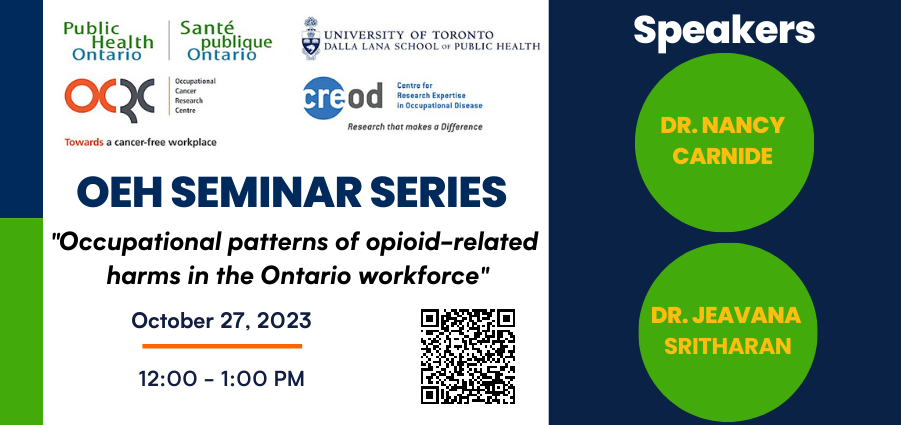- Location
- Webinars will be held via Zoom, details will be sent to all registered participants.
- Series/Type
- DLSPH Event
- Format
- Online
- Dates
- October 27, 2023 from 12:00pm to 1:00pm
Links
About this event:
Title: “Occupational patterns of opioid-related harms in the Ontario workforce”
The opioid crisis continues in Canada, with data suggesting men of working age and workers in construction are being disproportionately affected. Current health surveillance systems that monitor opioid-related harms have limited or no employment information. The Occupational Disease Surveillance System (ODSS), designed to detect work-related disease in a large cohort of formerly injured Ontario workers, was recently expanded to identify opioid-related hospitalizations and emergency department visits. In this presentation, Dr. Jeavana Sritharan and Dr. Nancy Carnide will share new findings from analyses of these data, including the occupational groups found to be at highest risk for opioid-related harms and the results comparing rates of opioid-related harms among workers in the ODSS to those in the general Ontario population.
Presenters: Dr. Nancy Carnide and Dr. Jeavana Sritharan
Dr. Nancy Carnide is a Scientist at the Institute for Work & Health. She is also an Assistant Professor (status) in the Division of Epidemiology at the University of Toronto’s Dalla Lana School of Public Health. Dr. Carnide conducts research at the intersection between occupational health and safety and substance use, examining the use and non-medical use of prescription and recreational drugs among workers, their risk factors and the workplace impacts of their use.
Dr. Jeavana Sritharan is a Scientist at the Occupational Cancer Research Centre (OCRC) based at Ontario Health. She is also an Assistant Professor (status) at the University of Toronto’s Dalla Lana School of Public Health. She leads the Occupational Disease Surveillance Program at OCRC to examine various cancers and non-malignant diseases in the Ontario worker population. More recently, the program was expanded to include COVID-19 and opioid-related harms.
